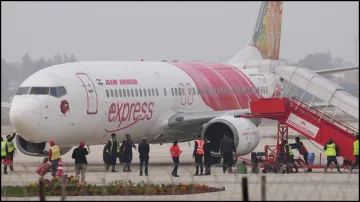New Delhi: In a dramatic development, Air India has suspended all scheduled flights to and from Tel Aviv in Israel "with immediate effect" in view of escalating tensions in the Middle East after the killings of Hamas leader Ismail Haniyeh in Iran and Hezbollah senior commander Fuad Shukr in Beirut. Haniyeh's brazen killing has triggered calls for retaliation and fuelled fears of a widened conflict in the Middle East.
"We are continuously monitoring the situation and are extending support to our passengers with confirmed bookings for travel to and from Tel Aviv during this period, with a one-time waiver on rescheduling and cancellation charges," wrote Air India on X. "Safety of our guests and crew remains our foremost priority."
Earlier, senior Hamas official Khalil Al-Hayya said Haniyeh was killed by a missile that hit him "directly" in a state guesthouse where he was staying in Tehran while attending Iranian President Masoud Pezeshkian's swearing-in ceremony. It later came to light that the Hamas leader was killed by an explosive device covertly smuggled into the guesthouse months ago, which was detonated remotely. The brazen attack on Haniyeh has dealt a critical blow to the Palestinian militant group and exposed the 'catastrophic failure' of Iran's intelligence and security.
The suspected assassination by Israel of Hamas' Haniyeh in Iran on Wednesday and Fuad Shukr, Hezbollah's most senior military commander, in Beirut a few hours earlier increases the risk of a dangerous escalation in Israel's Gaza war and of a regional conflagration between Israel, Iran and its proxies. Iran's Supreme Leader Ayatollah Ali Khamenei had ordered a "direct attack" on Israel in retaliation for Haniyeh's death, reported the New York Times.
Haniyeh was the tough-talking face of Hamas' international diplomacy and represented the group in the months-long peace talks mediated by Egypt and Qatar. Iran declared three days of national mourning in Haniyeh's honour and said the US bore responsibility because of its support for Israel. Hamas' armed wing said in a statement Haniyeh's killing would "take the battle to new dimensions and have major repercussions".
Meanwhile, Israeli Prime Minister Benjamin Netanyahu made no mention of Haniyeh's killing in a televised statement on Wednesday but said Israel had delivered crushing blows to Iran's proxies of late, including Hamas and Hezbollah, and would respond forcefully to any attack. "We are prepared for any scenario and we will stand united and determined against any threat. Israel will exact a heavy price for any aggression against us from any arena," he said.
The Israel Defence Forces (IDF) said its military is on ‘high alert’ and ready to handle any threat, bracing for a potential response to the killings of Haniyeh and Hezbollah’s military chief Fuad Shukr in Beirut. While Israel has not claimed responsibility for the attack on Haniyeh, Iran and Hamas have accused it of carrying out the assassination and threatened retaliation.
In the latest development, Hezbollah fired a barrage of rockets into Israel's Western Galilee in the late hours of Thursday (local time). In response to Hezbollah's strike, the IDF struck a Hezbollah rocket launcher in southern Lebanon's Yater, which was being used to fire a barrage at the Western Galilee. The Hezbollah strike came over 48 hours after the terror group's military chief was killed in an Israeli strike in Beirut.
Notably, Iran came close to an all-out war with Israel in April, when it fired hundreds of missiles and drones in retaliation for an Israeli airstrike on its embassy in Syria that killed several Iranian military commanders in Damascus. While it was the biggest direct attack by Iran in the decades of its shadow war with Israel, the damage was limited as almost all the weapons were shot down by Israel and its allies.
ALSO READ | Iran's Supreme Leader orders direct attack on Israel after Ismail Haniyeh's assassination: Report
Latest India News
